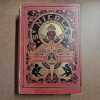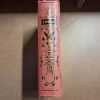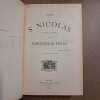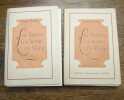13273 books for « nicolas a »Edit
-
Type
Art print (2)
Artists book (1)
Autograph (1)
Book (12747)
Disk (1)
Engraving (73)
Magazine (7)
Manuscript (3)
Maps (333)
Music sheets (80)
New book (6)
Old papers (3)
Photographs (15)
Posters (1)
-
Latest
Last 24h (26)
Last 3 days (15)
Last month (130)
Last week (590)
-
Language
Dutch (1)
English (12)
French (13228)
German (6)
Italian (2)
Latin (3)
Russian (3)
Spanish (18)
-
Century
16th (36)
17th (313)
18th (1159)
19th (876)
20th (3434)
21st (2277)
-
Countries
Belgium (535)
Brazil (3)
Canada (90)
China (10)
Côte d'Ivoire (26)
Denmark (90)
France (10991)
Germany (49)
Greece (16)
Italy (9)
Netherlands (1)
Switzerland (1430)
United Kingdom (5)
United States of America (18)
-
Syndicate
ALAC (84)
CLAM (60)
CLAQ (14)
CNE (29)
ILAB (5635)
NVVA (164)
SLACES (164)
SLAM (5140)
SNCAO (37)
Topics
- Alsace (55)
- Ampelography - wines (239)
- Archaeology (56)
- Architecture (86)
- Autographs (65)
- Biography (110)
- Boileau - narcejac (153)
- Books from the xviiith (52)
- Borge jacques (104)
- Bouvier nicolas (62)
- Brittany (51)
- Buffon (43)
- Burgundy (41)
- Catholicism (60)
- Children’s books (87)
- Christianity (77)
- Cinema (40)
- Comic strip (136)
- Condorcet (41)
- Cooking (72)
- Costumes (42)
- Curiosa (56)
- Customs (48)
- Drawings (47)
- Early printed books (141)
- Economics (102)
- Education (80)
- Education - morals (44)
- Engraving (books about) (56)
- Europe (79)
- Fine arts (110)
- First edition (278)
- Gastronomy (77)
- Genealogy (45)
- Geography (120)
- Gogol nicolas (155)
- Guide books (51)
- Helvética (145)
- History (747)
- Hulot nicolas (110)
- Humour anecdotes (47)
- Iron (130)
- Italy (45)
- Law (152)
- Literature (1253)
- Lorrain (50)
- Magazine (81)
- Malebranche nicolas de (65)
- Maps (407)
- Mathematics (60)
- Medicine (129)
- Memories (46)
- Military arts (85)
- Navy (77)
- Newspapers press (134)
- Niccolo machiavelli (70)
- North america (63)
- Oenology (105)
- Painting (46)
- Paris (187)
- Philosophy (252)
- Photography (132)
- Poetry (146)
- Policy (167)
- Portraits (55)
- Portugal (42)
- Poussin nicolas (45)
- Psychology (52)
- Regionalism (183)
- Religions (196)
- Reliure (53)
- Review (58)
- Reviews (94)
- Revolution 1789 (70)
- Russia (126)
- Samson (130)
- Sanson (127)
- Sciences (99)
- Scores (79)
- Short stories (49)
- Songs (81)
- Switzerland (190)
- Theatre (81)
- Theology (114)
- Translation (62)
- Travel (94)
- Turkey - ottoman empire (44)
- Ussr (56)
- Vanier nicolas (85)
- Various (86)
- Viasnoff nicolas (107)
- Viticulture (70)
- War (84)
- West indies (61)
- Wine (129)
- Youth (44)
Saint-Nicolas - Journal illustré - Année 1915
1915 - relié - Tome 36 - Année 1915 - A Paris, Librairie Delagrave - Fort in-4 (27 x 19 cm) reliure percaline rouge richement décorée - 832 pages - Très nombreuses illustrations en N&B in et hors texte - Saint-Nicolas est un hebdomadaire français créé en 1880 et disparu durant la Première Guerre mondiale en 1915. Paraissant le jeudi, jour de repos scolaire, ce journal illustré pour garçons et filles, proposait des histoires en images dont certaines étaient signées par trois futurs pionniers de la bande-dessinée : Léonce Petit, René Giffey et Joseph Pinchon, ainsi que le peintre Raymond de La Nézière et le décorateur Emil Causé
Bon état - Quelques frottements sur la reliure - Mors légèrement fragilisés - Infimes déchirures sur les bords de certaines pages (sans manque de papier, ni gêne pour la lecture)
"BERNOULLI, (JOHANN). (+) NICOLAS (NIKOLAUS) BERNOULLI. - VIS-VIVA CONTROVERSY
Reference : 44748
(1714)
Extrait D'une Lettre de M. Bernoulli, écrite de Basle 10. Janvier 1711, touchant la maniere de trouver les forces centrales dans des milieux resistans en raisons composée de leurs densites & des puissances quelques des vitesses du mobile. (+) Addition...
(Paris, L'Imprimerie Royale, 1714). 4to. Without wrappers. Extracted from ""Mémoires de l'Academie des Sciences. Année 1711"". Pp. 47-53 a. pp. 53-56 (Nicolas).
First appearance of an importent paper in mathematical physics. Bernoulli had shown that the principle of virtual velocities could be shown in analytical form. The principle can be derived from the energy principle and he applied this principle several times to mechanical systems of central forces. For these forces he applied the vis viva equation to the inverse two-body problem. For the corresponding problem of centrally accelerated motion in resisting medium he solved the differential equations and determined the central force in accordance with the Huygens formula(in the paper offered). - The Addenda by his his nephew, Nicolas Bernoulli, best known for the fundamental work ""Ars Conjectandi"" from 1713.
XX Siècle. Nouvelle Série. N°39. Décembre 1972. Panorama 72**. Cahiers d'Art publiés sous la direction de G. Di San Lazzaro. Un homme libre : Nicolas de Stael.
Société Internationale d'Art XX Siècle, Paris, 1972. Un volume relié (24,5x31 cm) de 156 pp. et 8 pp. de catalogue in fine. Reliure cartonnage d'éditeur illustrée par Nicolas de Stael. Ouvrage en très bon état.Une lithographie originale de Sonia Delaunay. Une lithographie originale de Maurice Estève.
Le Riche Mecontent, ou le Noble Imaginaire. Comedie. Representee sur le Theatre Royal de l'Hotel de Bourgogne (+) Les Engagement du Hazard, Comedie (+) Les Yvrongnes, comédie satiribulesque. - [THREE RARE FRENCH PLAYS]
Paris, Baptiste Loyson, 1662 (+) Paris, Coube, 1657 (+) Cologne, Pierre Marteau, 1687. 8vo. In contemporary ful calf with four raised bands and gilt ornamentation to spine. Super ex-libris to boards. Small paper-label pasted on to top of spine. Light wear to extremities, parts of gilting on spine worn off. Internally lightly browned and closely trimmed, occassionally touching letters. (10), 82, (12), 94, (4), 52 pp.
Three early French plays, all first editions, from what is widely regarded as being the golden age of French playwriting. All are of the utmost scarcity and we have only been able to trace one auction-record, namely that of “Le Riche Mecontent” (Sold at “Early English Literature and Americana duplicates and selections from the Library of Henry E. Huntington”, 1920 - described as ""Very scarce""). These plays are all examples of French comedy from the 17th century, a period marked by the flourishing of theater in France, particularly in Paris. This era witnessed the development of a distinct French theatrical tradition with an emphasis on comedic works. These plays incorporate satire, using humor, irony, or ridicule to criticize and mock societal norms, behaviors or specific social groups “Le Riche Mecontent” was written for Hôtel de Bourgogne, a theatre, built in 1548 for the first authorized theatre troupe in Paris, the Confrérie de la Passion. It was considered the most important French theatre until the 1630s, it continued to be used until 1783. Nicolas de Péchantré (1638 – 1708), author of 'Les Engagement' and 'Les Yvrongnes' obtained three times the laurel at the Academy of Floral Games, and acquired great popularity by his tragedy of Greta. Georges Vicaire, French bibliophile and bibliographer, attributed “Les Yvrongnes” to Péchantré. Brunet 1, 1800 (Le Riche Mecontent). Not in Graesse, Barbier or Tchemerzine.
Les Contes d'un Buveur de Bière. Dessins originaux.
Éditions Guy Le Prat ( Paris ) / Les Auteurs Associés ( Bruxelles ) 1944. 20 x 14 cm, 214 pp. Broché couverture rempliée, en feuilles non coupé. Sous étui et emboîtage, l'étui est cassé sinon très bel exemplaire. Contes illustrés de 8 magnifiques hors texte en couleurs par Nicolas Eekman, dont le frontispice. Un des 10 exemplaires numérotés hors-commerce sur Nippon Mosmé, réservés aux collaborateurs, avec une suite de décomposition des couleurs soit 80 planches, avec trois dessins originaux et deux "clichés".
Memoires des deux dernieres campagnes de Monsieur de Turenne en Allemagne.
Strasbourg, Jean Renauld Doulssecker, 1734. 8vo. In a nice contemporary Cambridge-style mirror binding with four raised bands and richly gilt spine. Small paper-label pasted on to top of spine. A very nice and clean copy. 250 pp.
Uncommon first edition of this account of the campaigns of The Battle of Mulhouse in 1674 and The Battle of Turckheim 1675 in Alsace and Germany, written immediately after the events. Nicolas Deschamps, future tutor to the Duke of Bourbon, served under Marshal de Turenne.
Oeuvres avec des eclaircissemens historiques, donnez par lui-meme. Nouvelle edition revue, corrigee & augmentee de diverses remarques. 2 vols.
Amsterdam, D. Mortier, 1718. 4to. 2 parts bound in 1 full calf binding with five raised bands and coloured frames to boards. Wear and soiling to extremities. A few worm holes to spine. Title-page to vol. 2 with a few lines in red pencil in margin. Last few leaves brownpostted. Internally generally fine and clean. (2), XXIV, (2), 454" (4), VII, (1), 424, (24) pp. + frontispiece, large folded portrait (Wilhelmina Charlotte Princess of Wales by F. Gunst after Kneller), and 6 plates.
The uncommon 4to-edition of Boileau-Despreaux’s Oeuvres. Nicolas Boileau (1636-1711), often simply known as Boileau, achieved acclaim as a distinguished French poet and critic in the 17th century. Initially educated at the College of Beauvais with intentions of pursuing a clerical path, he eventually shifted his focus from theology to law to fulfill his father's wishes. Boileau's literary journey commenced with the publication of his first satirical poem, ""Adieux d'un poète à la ville de Paris,"" at the age of 25. Subsequently, he released six more satires, including notable works like ""Les embarras de Paris,"" ""La satire à Molière,"" and ""Le repas ridicule."" In these satires, Boileau not only parodied and critiqued figures such as Cotin, Chapelain, and Le Voyer but also played a pivotal role in refining the practical aspects of the French language. Notably, these satires marked the introduction of systematic literary criticism in France, focusing on art's merits rather than being driven by envy or anger. Tchemerzine II, 293Brunet 1, 1058
Notions élémentaires du nouveau droit civil ou exposé méthodique des dispositions du Code civil pour en faciliter l'intelligence.
A Paris, chez Rodonneau, au Dépôt des Lois, An XII, 1803, An XIII, 1805. 20 x 13 cm, 280-196-304- et xvj-304 pp. Quatre tomes en un volume relié plein veau d'époque, dos lisse, pièce de titre rouge. Reliure usée, épidermures, coins émoussés, une mouillure claire sans gravité sur les premières pages. Sinon bon exemplaire. Ex-libris contrecollé sur le contre plat, de Pierre Culot. Rare.
Eustache-Nicolas Pigeau, né le 16 juillet 1750 à Mont-l'Évêque (Oise) et mort le 22 décembre 1818 à Paris, est un jurisconsulte français.Fils d'un artisan, il travaille comme clerc chez un procureur avant de devenir en 1774, avocat au Parlement de Paris. Il devient secrétaire de Marie-Jean Hérault de Séchelles. Il ouvre après la Révolution des cours de droit. Il est nommé par Napoléon Bonaparte membre de la commission chargée de rédiger le Code de procédure civile. En 1805 il est nommé professeur de procédure à l'École de Droit de Paris, poste qu'il conserve jusqu'à sa mort.
Histoire florentine de Nicolas Machiavel citoien et Secretaire de Florence. Nouvellement traduicte d'Italien en Francois, Par le Seigneur de Brinon Gentil-homme ordinaire de la chambre du Roy. - [FIRST FRENCH TRANSLATION OF MACHIAVELLI'S 'FLORENTINE HISTORIES']
Paris, Guillaume de la Noue, 1577. 8vo. In recent full limp vellum with yapp edges. Woodcut printer's device on title, woodcut headpieces and initials. Small closed tear to upper inner margin of title-page. First 33 ff. with small worm tract in inner margin, with minor loss of text. Light dampstaining to first and last leaves. A good copy. (36), 294, (6) pp.
The exceedingly rare first French, and presumably very first overall, translation, of Machiavelli's Florentine Histories" his famous account of the political events and power struggles in Florence during the Renaissance. Essentially being a panegyric to the house of Medici, Machiavelli's work offers valuable insights into the rise and fall of political factions, the challenges faced by republican governments, and the dynamics of power in a city-state. Although often overshadowed by his more famous 'The Prince', the present work is important in understanding Machiavelli's broader political philosophy and is an indispensable document in understanding renaissance politics in general. The Histories constitute an essential work for understanding the political development of the late Machiavelli, and is “also an important item in modern historiography because for the first time the issue of conflict, and more precisely of urban conflict, finds itself at the heart of historical narrative (…).Infact, the Histories constitute the first attempt in modern historiography to analyze the totality of individual and collective agents and factors that allow a community to sustain itself or to founder. This analytical quality was certainly at the basis of the interest in the work outside Florence and the fact of its being translated. As Yves de Brinon explains in dedicating his ‘Histoire Florentine [the present work] to Cathrine de Medici, the case of Florence is a model for the dangers that threaten the integrity of every state and the Kingdom of France in Particular.” (Landi, A re-reading of Machiavelli). Machiavelli visited France, representing the Republic of Florence, where he - and later his writings - exercised great influence. The Huguenot, Innocent Gentillet, whose work commonly referred to as 'Discourse against Machiavelli' or 'Anti Machiavel', accused Machiavelli of being an atheist and accused politicians of his time by saying that his works were the ""Koran of the courtiers"", that ""he is of no reputation in the court of France which hath not Machiavel's writings at the fingers ends"" (Birely, The Counter Reformation, 1990). “Although Machiavelli became the embodiment of a real ""devil theory of history,"" there was nothing supernatural or even suspicious about his journey across the Alps. As the French translator remarked to his customers in 1544, ""This Florentine merchant has voluntarily left his own country to be received into yours.... Do not be so ungracious as to refuse him citizenship. From all appearances he was welcomed with open arms, or at least open minds. Within a few years, one of his admirers declared that he was a prophet honored more in France than in his own country."" (Kelley, Murd'rous Machiavel in France: A Post Mortem). Following the crisis of 1513, which involved arrests for conspiracy and torture, Machiavelli's relationship with the Medici family gradually improved. Despite the dedication of his book ""Il Principe"" to Lorenzo II de' Medici having little effect, Machiavelli found favor with a faction in Florence that was not opposed to him and was granted an appointment. In a letter Machiavelli expressed his dissatisfaction with his idle state and offered his valuable political experience to the new ruler. To further solidify his position, Machiavelli, adopting a somewhat courtier-like attitude, arranged for the staging of his play ""Mandragola"" at the wedding of Lorenzino de' Medici in 1518. In 1520, he received an invitation to Lucca for a semi-private mission, indicating that his ostracism was coming to an end. Later that year, Giulio Cardinal de Medici commissioned him to write a history of Florence. Although this was not exactly the role he desired, Machiavelli accepted it as the only way to regain the favor of the Medicis. The purpose of the work, although unofficial, was to restore the city's official historical standing. The salary for this appointment was not substantial, starting at 57 florins per year and later increased to 100. In May 1526, Machiavelli formally presented the finished work to Giulio de' Medici, who had become Pope Clement VII. The Pope appreciated the work and rewarded Machiavelli, though only moderately, and sought his support in creating a national army based on his theoretical work ""The Art of War,"" in preparation for the War of the League of Cognac. However, Machiavelli's hopes were shattered following the Sack of Rome in 1527 and the fall of the Medici government in Florence. Soon after, Machiavelli passed away. This exceedingly scarce first French edition was issued with two variant title-pages, the present referred to as variant-b. (see Gerber, Niccolo Machiavelli). Bibliopgraphia Machiavelliana, p. 60, no. 160. Gerber, dritter teil, p. 37, D-b. Brunet 1279.
Soirées bruxelloises. Histoire littéraire de l'année : études critiques et biographiques sur Weustenraad, Walef, Lainez, M. Clesse.
Bruxelles, Libr. Polytechnique d'Aug. Decq, 1854. 16,5 x 11,5 cm, 228 pp. Relié bradel plein papier, étiquette de titre manuscrite. Reliure usée, coins émoussés, petits manques de papier. Provenance : bibliothèque de l'architecte A. Fritz, ex-libris et numéro d'inventaire.
Cet ouvrage est l'oeuvre de quatre jeunes écrivains liégeois, Eugène GOFFART, Hyacinthe KUBORN, Nicolas PEETERMANS et A. GILMAN. Pourquoi est-il intitulé Soirées bruxelloises? On ne nous l'apprend pas. Mais en voici le but et le dessein. Les quatre amis se réunissant souvent le soir et causant entr'eux de l'une ou l'autre nouveauté littéraire du pays, regrettoient, disentils, que sa destinée fût de mourir le lendemain. «Ils auroient voulu voir consigner comme dans un registre domestique les succès et les mécomptes de la phalange toujours croissante de nos écrivains, inscrire dans un livre durable les espérances qu'on fondoit sur eux, les conseils ou les cris d'alarme que la critique, sentinelle avancée, leur jetoit de temps à autre au profit de l'art... Alors leur vint l'idée d'analyser le drame, le poème, le roman, que l'année avoit vus éclore, de faire entre eux l'inventaire de toutes ces productions, et d'en dresser comme un bilan à leur usage. » Cependant ils ne vouloient pas se borner au présent; le passé devoit entrer dans cet examen, et il leur sembloit qu'il falloit comparer les productions nouvelles avec celles des temps antérieurs. En conséquence, deux de ces messieurs se chargèrent de faire en quelque sorte revivre le baron de Walef et Lainez, poètes belges du 17° siècle; et les deux autres résolurent de s'occuper des poésies de feu M. Weustenraad et de M. Clesse.
Les Oeuvres poétiques françoises de Nicolas Ellain, parisien (1561-1570) publiées par Ach. Genty.
Paris, Librairie Poulet-Malassis, 1861. Un volume broché (12,5 x 16 cm) de 89 pages. Exemplaire quasi non coupé. Quelques rousseurs sur les papiers de doublures des couvertures. Sinon bon exemplaire. Édition à 355 ex. num., celui-ci est un des 145 sur vergé.
Lettres de Nicolas Poussin. Précédées de la Vie du Poussin Par Félibien.
Paris, Wittmann, 1945. Small 8vo. Orig. printed wrappers. 176,(2) pp. Limited to 825 copies. This No XXV of 150 ""reserve aux amis de Lettres"".
PRÉVOST D'EXILES, ANTOINE-FRANCOIS, JACQUES-NICOLAS BELLIN ET AL.
Reference : 53621
(1746)
Histoire générale des Voyages ou nouvelle Collection de toutes les Relations de Voyages par Mer et par Terre, qui ont été publiées jusqu'à Présent dans les differentes Langues de toutes les Nations connues: contenant ce qu'il y a de plus remarq...
Paris, Chez Didot, 1746-61 (Vols. 1-16) a. Amsterdam, Arkstée et Merkus, 1761 (Vol. 17) a. Paris, Rozet, 1768 (Vol. 18) a. Paris, Panckoucke, 1770 (Vol. 19). 4to. Bound in 19 uniform contemp. hcalf. Richly gilt spines. Titlelabels with gilt lettering. Spines a bit rubbed with light wear to the gilding. All spine-ends neathly repaired with matching leather. Stamps on half-titles. Engraved portrait of Prevost as frontispiece to volume 1. (The portrait with faint brownspots). In all more than 10.000 pp. and with 561 maps, plans and plates, of these ca. 250 engraved maps, many large and folding. A few plates inserted in a wrong volume, but all plates seems to be present in accordence with the listings of the plates. One leaf torn in volume 18, but all text preserved. Very few scattered brownspots. A few quires in one volume with light browning. No repairs to maps. All volumes printed on good paper. A clean and attractive set. The last volume (XX) was issued much later (1789) and is not present here.
First edition of Prevost's important and impressive collection of explorations and travels, including most of the early American voyages and travels. The first 15 volumes were prepared by Prévost and the following volumes by other authors. The fine maps were done by Jacques-Nicolas Bellin.Sabin, 65402.
Entretiens sur la Metaphysique & sur la Religion.
Rotterdam, Reinier Leers, 1688. Small 8vo. Fine contemp. full mottled calf, richly gilt back. Titlelabel in leather. (6),604 pp. A very small inkspot in upper margin of the last 20 leaves. On good paper, clean and fine.
First edition. Malebranche is one of the major philosophers of Cartesianism and his philosophy sought to synthesize Cartesianism with the thought of St. Augustin and with Neoplatonism. His ""Entretiens..."" (Dialogues on Metaphysics and Religion) as a series of 14 dialogues, is perhaps the best introduction to his philosophy in general.""The French Cartesian Nicolas Malebranche was hailed by his contemporary, Pierre Bayle, as ""the premier philosopher of our age."" Over the course of his philosophical career, Malebranche published major works on metaphysics, theology, and ethics, as well as studies on optics, the laws of motion and the nature of color. He is known principally for offering a highly original synthesis of the views of his intellectual heroes, St. Augustine and René Descartes. Two distinctive reults of this synthesis are Malebranche's doctrine that we see bodies through ideas in God and his occasionalist conclusion that God is the only real cause."" (Stanford Encycl. of Philosophy).
Le Portrait. Traduction de D. Ergaz. Suivi du Journal d'un fou. Traduction de B. de Schloezer et J. Schiffrin. Ornements de A. Alexeïff.
Paris, Éditions de la Pléiade J. Schiffrin, 1929. 21,5 x 15 cm, 225 pp. Broché, couverture rempliée. Exemplaire non coupé en très bon état. Étiquette ex-libris sur la page de garde. Un des 1550 ex. num. sur vélin du Marais.
Oevres complètes. 2 tomes.
Paris, Hachette, 1886. 8vo. Bound in two contemporary half morocco bindings. Gilt title and five raised bands to spines. Spines faded. Slight wear to extremeties. Large waterstains throughout first volume.
Jean-Hubert Martin, Alain Nicolas, Jacques Kerchahce, Monique Barbier-Mueller.
Reference : 7169
African Faces, African Figures. The Arman Collection.
Museum for African Art, 1997. 31 x 24 cm, 279 pp. Relié cartonnage d'éditeur sous jaquette illustrée. Bon exemplaire.
Tarass Boulba. Préface de Paul Reboux. Dessins et eaux-fortes de P. Arcangioli.
Sans lieu, Édition d'Art "Les Emeraudes", 1949. 33 x 25 cm, 200 pp. En feuilles, sous couverture rempliée imprimée, sous étui et emboîtage. Étui cassé sinon bon exemplaire. Tirage limité à 400 exemplaires numérotés, celui-ci un des 320 sur vélin de Rives. Les lettrines ont été peintes à la main par P. Arcangioli qui a également exécuté le tirage des 21 eaux-fortes hors-texte (dont le portrait en frontispice) avec sa signature au crayon en marge.
"RETIF DE LA BRETONNE, NICOLAS-EDME (+) C. F. CRAMER (translator).
Reference : 62012
(1780)
Das Leben meines Vaters. 2 parts.
Lübeck, 1780. 8vo. In contemporary half calf with four raised bands and gilt lettering to spine. Old paper-label pasted on to top of spine. Vague damp-stain to upper margin, otherwise a nice and clean copy printed on good paper. (4), 220, 192 pp.
Exceedingly rare German translation, published the same year as the first German translation (Berlin, 1780) and published the year after the original French (La Vie de mon Père), of Bretonne’s – according to himself - most valuable work he ever produced. It stands out as one of the most vivid and faithful portrayals of peasant life on the eve of the French Revolution. This biography of Edmé Restif (1692–1764), a Burgundian ploughman and the author's father, offers a rare and detailed glimpse into rural France in the eighteenth century. ""This work, the most esteemed of mine and the one that has had the most general success, was inspired to me all of a sudden, while finishing the printing of the 'Nouvel Abeilard', on which I had been working tirelessly, I put pen to paper with ardor and wrote it all at once, for I was occupied with nothing else, as long as the printing lasted."" (Bretonne, Mes ouvrages, p. 149).
L'arithmétique du Sr Barrême ou livre facile pour apprendre l'arithmétique de soi-même , & sans maître. Nouvelle édition, augmentée de plus de 190 pages.
Rouen, chez Laurent Dumesnil, MDCC. LXXIX. [1779]. 17,5 x 10 cm, 5 ff. 491 pp. et 78 pages non paginées. Nombreuses figures dans le texte. relié plein veau marbré d'époque, dos ànerfs, caissons ornés, pièce de titre, tranches rouges. Légères traces de frottements sinon bel exemplaire.
"CONDORCET, (MARIE JEAN ANTOINE NICOLAS CARITAT MARQUIS de).
Reference : 61971
(1797)
Udkast til et Historisk Skilderie af den menneskelige Aands Fremskridt. I Haandskrivt efterladt. Oversat af K.H. seidelin. - [CAN MAN BECOME PERFECT?]
København, Tikiøbs Forlag, 1797. 8vo. Bound in a contemporary half calf binding with gilt spine and gilt title label. Minor cracks to spine. Insignificant wear to capitals. Edges of boards worn. Corners bumped. Bibliographical notes to front free endpaper. Small ownership stamp to verso of title page. Evenly browned. XII,(2),368,(1: errata) pp.
The extremely rare first Danish edition of Condorcet's main work ""Esquisse d'un tableau historique des progrès de l'esprit humain.1795"", ""the most fully developed exposition of the progress of man"" (Printing and the Mind of Man, p. 149) and a main work of the Enlightenment as well as of historical thought in general. The author was the creator of what came to found the basis for the modern French system. The great French philosopher, political thinker and mathematician, M.J.A. Condorcet (1743 - 1794), played a seminal role in 18th century France. He was friends with the likes of d'Alembert, Voltaire, Turgot etc., and he greatly contributed to the social and political debates of politically turbulent France. As one of the few, he advocated a liberal economy, equality in public education as well as in gender and race etc. He preached constitutionalism, and his thoughts that are still influential today embody those of the Enlightenment and rationalism.""A belief in the ultimate perfectibility of man lies at the root of all progressive thinking about the human condition. The ""philosophes"" and Godwin had familiarized the reading public with this notion" it was left to Condorcet to give it its finest and most durable expression. It was the gospel of nineteenth century that mankind is destined for indefinite future progress. Condorcet, looking back and then forward, saw proof of this in the growing equality between classes and nations, the intellectual, physical and moral improvement of man" and he prophesied that popular education on correct principles would strengthen and assure this progress."" (PMM 246).During the French Revolution Condorcet came to play a dominating role, advocating a rationalist reconstruction of society, and he championed many liberal causes. In 1791 he became secretary of the Legislation Assembly, and the institution adopted his scheme for comprehensive state education, which later became the basis of the modern French system. In the struggle between the two political parties, the Girondists and the Montagnards, Condorcet occupied an independent role, but when he opposed the death penalty under the trial of King Louis XVI (still supporting the actual trial), and the radical Montagnards gained more power, Condorcet was branded a traitor, and in October 1793 a warrant was issued for his arrest. He now went into hiding for several months (almost a year), and it is during these months that he writes the work that was to become his most important, the main work ""Esquisse..."" (""Sketch for a Historical Picture of the Progress of the Human Mind""), which was published posthumously, the year after his death. In 1794 Condorcet was arrested, and two days later he was found dead in his cell, -it is unknown whether he committed suicide or was murdered because of fear of fierce reactions that would definitely have occurred had the beloved man been officially sentenced to the death penalty.""In the Esquisse"", published after his death, Condorcet traces the history of man through epochs, the first three covering his progress from savagery to pastoral community and thence to the agricultural state. The next five span the growth of civilizations and knowledge down to Descartes, and the ninth describes the revolution of Condorcet's own lifetime, from Newton to Rousseau. The prophetic view of the tenth epoch shows Condorcet at his most original. He forecasts the destruction of inequality between nation and classes, and the improvement, intellectual, moral and physical, of human nature..., it exercised considerable influence on Comte. But it is as the most fully developed exposition of the progress of man that Condorcet's work is now remembered, and it is this which has given it its lasting appeal."" (PMM 246).
Le mobilier français du musée Jacquemart-André.
Editions Faton, Mécénat Didier Aaron & Cie, 2006. 30 x 23,5 cm, 262 pp. Relié pleine peau d'éditeur, tête dorée sous étui. Bel exemplaire. Un des 170 ex. num. relié pleine peau.
L'héritage des chasseurs-cueilleurs dans le Nord-Ouest de l'Europe, 10000 - 3000 avant notre ère.
Paris, Errance, 2001. 24 x 16 cm, 207 pages, cartes et figures en noir. Broché, bel exemplaire. Quelques annotations. Envoi autographe signé de l'auteur.
Nicolas Cauwe, Pavel Dolukhanov, Pavel Kozlowzki, Paul-louis Van Berg.
Reference : 6472
Le Néolithique en Europe.
Paris, Armand Colin, 2007. 24 x 16 cm, 380 pp. Broché, quelques annotations sinon bon exemplaire. Quelques annotations.Envoi autographe signé de l'auteur.
SAINCTONGE (+) REMOND, DES COURS, NICOLAS (+) (LASAVILE, GEORGE)
Reference : 61580
(1696)
Histoire de Dom Antoine, roy de Portugal tiree des memoires de Dom Gomes Vasconcellos de Figueredo (+) Les véritables devoirs de l'Homme d'épée, particulièrement d'un Gentilhomme (+) Conseils D'Un Homme De Qualite A Sa Fille.
Amsterdam, Lorme & Roger, 1696 (+) Amsterdam, Braakman, 1697 (+) A La Haye, Van Dole, 1698. 12mo. In contemporary full vellum with title in contemporary hand to spine. Small paper-label pasted on to top of spine. Light wear to extremities, other wise nice and clean. (Frontispiece), 5-178, (Blank), (Frontispiece), (14), 244, (4), (Frontispiece), (6), 152 pp.
Interesting sammelband containing three works all sharing a focus on the values, virtues, and social roles of nobility and the upper classes in European society.
 Write to the booksellers
Write to the booksellers






































